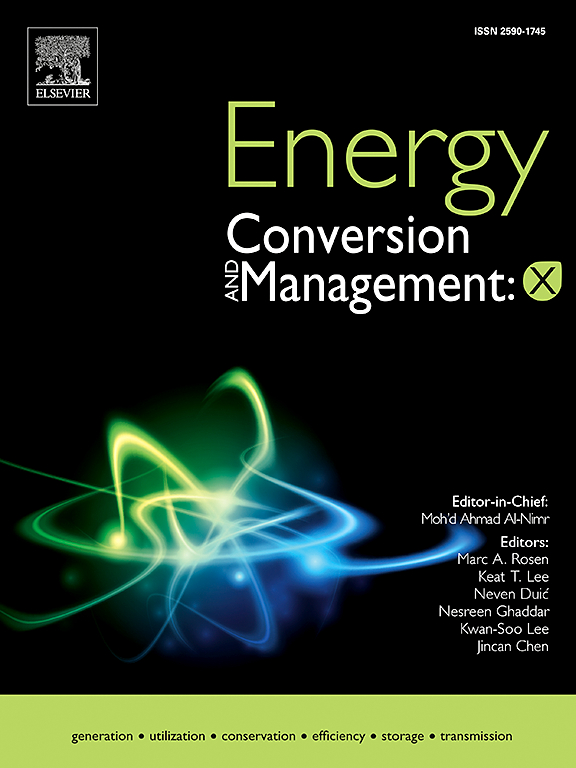在可变燃料价格和海上操作概况下,基于场景的集成电池尺寸和发电厂调度
IF 7.6
Q1 ENERGY & FUELS
引用次数: 0
摘要
船上越来越多地采用混合动力系统。目前,锂离子电池作为一种可行的储能解决方案,可以提高燃油效率,缩短主动力装置的运行时间,从而降低运营成本。然而,将电池集成到船上需要考虑多种情况的决策,包括电池化学成分、船舶操作剖面的变化以及燃料价格的波动。为了解决这些挑战,本研究调查了电池尺寸和电力和能源管理系统的调度是否需要基于场景的随机决策框架。具体来说,它研究了储能需求如何受到不同负载分布的影响,最佳电池尺寸和电源管理策略是否受到燃料价格波动的影响,以及在运行不确定性下整体策略的鲁棒性。引入了一种相当于两阶段随机决策框架的确定性方法来整合这些不确定性,从而深入了解所需的电池技术、容量和车载能源管理的相关行为。对耙吸式挖泥船进行了多种工况分析,分析了三种不同功率需求变化的负荷分布。在有备用功率约束的情况下,最佳电池容量保持固定。然而,当这些限制放宽时,最佳电池尺寸对燃料价格变化变得更加敏感。此外,研究结果还显示,柴油发动机的工作时间缩短了,从而降低了燃料消耗和维护成本,这表明,这些运行效益不仅取决于电池的尺寸,还取决于其可用吞吐量,从而允许更深的循环。本文章由计算机程序翻译,如有差异,请以英文原文为准。
A scenario-based integrated battery sizing and power plant scheduling under variable fuel prices and maritime operational profiles
Hybrid power systems are increasingly adopted onboard. Lithium-ion batteries now serve as a viable energy storage solution that enhances fuel efficiency and reduces the operating hours of main power units, thereby reducing operational expenses. However, integrating batteries onboard requires decision-making that accounts for diverse scenarios, including battery chemistry, variations in vessel operational profiles, and fluctuating fuel prices. To address these challenges, this study investigates whether battery sizing and scheduling of the power and energy management system require a scenario-based stochastic decision framework. Specifically, it examines how energy storage requirements are influenced by varying load profiles, whether the optimal battery size and power management strategy are affected by fuel price fluctuations, and how robust the overall strategy remains under operational uncertainties. A deterministic equivalent of a two-stage stochastic decision framework is introduced to incorporate these uncertainties, offering insights into the required battery technology, capacity, and correlated behavior of onboard energy management. Multiple scenarios are applied to a trailing suction hopper dredger, analyzing three load profiles with distinct variations in power demand. With reserve power constraints enforced, the optimal battery capacity remains fixed. However, when these constraints are relaxed, the optimal battery size becomes more sensitive to fuel price changes. In addition, the results showcase reduction in diesel engine operating hours—thereby lowering both fuel consumption and maintenance costs, demonstrating that these operational benefits depend not only on the battery’s size but also on its available throughput, which allows for deeper cycling.
求助全文
通过发布文献求助,成功后即可免费获取论文全文。
去求助
来源期刊

Energy Conversion and Management-X
Multiple-
CiteScore
8.80
自引率
3.20%
发文量
180
审稿时长
58 days
期刊介绍:
Energy Conversion and Management: X is the open access extension of the reputable journal Energy Conversion and Management, serving as a platform for interdisciplinary research on a wide array of critical energy subjects. The journal is dedicated to publishing original contributions and in-depth technical review articles that present groundbreaking research on topics spanning energy generation, utilization, conversion, storage, transmission, conservation, management, and sustainability.
The scope of Energy Conversion and Management: X encompasses various forms of energy, including mechanical, thermal, nuclear, chemical, electromagnetic, magnetic, and electric energy. It addresses all known energy resources, highlighting both conventional sources like fossil fuels and nuclear power, as well as renewable resources such as solar, biomass, hydro, wind, geothermal, and ocean energy.
 求助内容:
求助内容: 应助结果提醒方式:
应助结果提醒方式:


